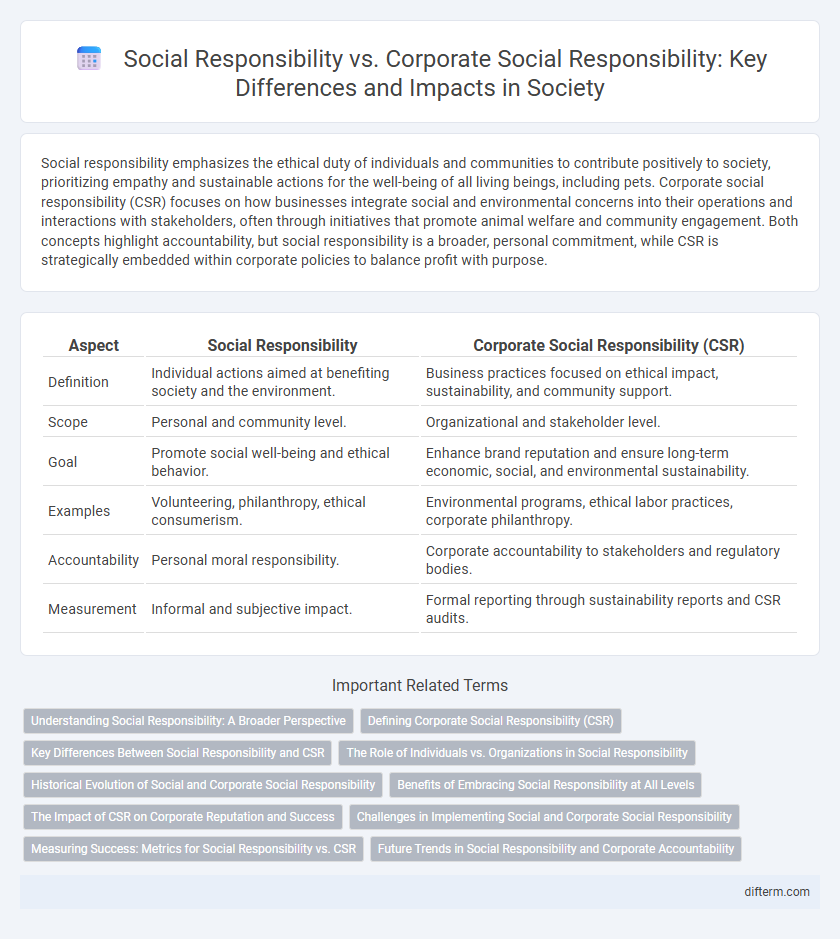Social responsibility emphasizes the ethical duty of individuals and communities to contribute positively to society, prioritizing empathy and sustainable actions for the well-being of all living beings, including pets. Corporate social responsibility (CSR) focuses on how businesses integrate social and environmental concerns into their operations and interactions with stakeholders, often through initiatives that promote animal welfare and community engagement. Both concepts highlight accountability, but social responsibility is a broader, personal commitment, while CSR is strategically embedded within corporate policies to balance profit with purpose.
Table of Comparison
| Aspect | Social Responsibility | Corporate Social Responsibility (CSR) |
|---|---|---|
| Definition | Individual actions aimed at benefiting society and the environment. | Business practices focused on ethical impact, sustainability, and community support. |
| Scope | Personal and community level. | Organizational and stakeholder level. |
| Goal | Promote social well-being and ethical behavior. | Enhance brand reputation and ensure long-term economic, social, and environmental sustainability. |
| Examples | Volunteering, philanthropy, ethical consumerism. | Environmental programs, ethical labor practices, corporate philanthropy. |
| Accountability | Personal moral responsibility. | Corporate accountability to stakeholders and regulatory bodies. |
| Measurement | Informal and subjective impact. | Formal reporting through sustainability reports and CSR audits. |
Understanding Social Responsibility: A Broader Perspective
Social responsibility encompasses the ethical framework where individuals and organizations act for the benefit of society at large, addressing issues like environmental sustainability, human rights, and community welfare. Corporate social responsibility (CSR) is a subset that focuses specifically on businesses' obligations to conduct operations ethically, transparently, and with positive social and environmental impacts. Understanding social responsibility from a broader perspective highlights the interconnected roles of both individuals and corporations in fostering societal well-being and sustainable development.
Defining Corporate Social Responsibility (CSR)
Corporate Social Responsibility (CSR) defines a company's commitment to ethical practices, social equity, and environmental sustainability beyond profit-making objectives. It involves integrating socially responsible initiatives into daily business operations, such as community engagement, environmental stewardship, and fair labor practices. CSR frameworks guide corporations in addressing stakeholder interests while fostering long-term economic growth and positive societal impact.
Key Differences Between Social Responsibility and CSR
Social responsibility refers to the ethical framework where individuals and organizations act for the benefit of society at large, emphasizing personal and collective accountability. Corporate social responsibility (CSR) specifically pertains to businesses integrating social and environmental concerns into their operations and stakeholder interactions, often through structured programs and reporting. Key differences include CSR's formalized corporate strategies versus the broader, more informal nature of social responsibility practiced by individuals and communities.
The Role of Individuals vs. Organizations in Social Responsibility
Individuals drive social responsibility by making conscious decisions that promote ethical behavior, environmental sustainability, and community well-being at a personal level. Organizations amplify social responsibility through structured initiatives, corporate policies, and resource allocation targeted at broader social impact and stakeholder engagement. The synergy between individual actions and corporate social responsibility efforts fosters a more comprehensive approach to addressing societal challenges.
Historical Evolution of Social and Corporate Social Responsibility
Social responsibility originated as a community-driven ethical framework emphasizing individual and collective duties within societies, dating back to ancient philosophical teachings. Corporate social responsibility (CSR) emerged in the mid-20th century, evolving from initial philanthropic efforts to integrated business strategies aligning profit with environmental sustainability and social equity. Key milestones include the 1953 Bowen Report, which formalized CSR concepts, and the 21st-century adoption of global standards like the UN Global Compact, reflecting the shift toward accountability and stakeholder engagement in corporate practices.
Benefits of Embracing Social Responsibility at All Levels
Embracing social responsibility at all levels fosters stronger community relationships, enhances brand reputation, and drives sustainable growth by aligning personal values with corporate actions. Individuals practicing social responsibility contribute to a culture of ethics and accountability, while corporations benefit from increased customer loyalty and investor trust through corporate social responsibility (CSR) initiatives. Integrating social responsibility into everyday decisions promotes environmental stewardship, social equity, and economic development, creating a ripple effect of positive impact across society.
The Impact of CSR on Corporate Reputation and Success
Corporate Social Responsibility (CSR) significantly enhances a company's reputation by demonstrating commitment to ethical practices, environmental sustainability, and community engagement, which fosters trust and loyalty among stakeholders. Positive CSR initiatives contribute to increased brand value, customer satisfaction, and employee motivation, directly correlating with improved financial performance and long-term success. Companies with strong CSR reputations attract investors, reduce risks, and gain competitive advantages in socially conscious markets.
Challenges in Implementing Social and Corporate Social Responsibility
Implementing Social Responsibility and Corporate Social Responsibility faces challenges such as aligning organizational goals with ethical practices, managing diverse stakeholder expectations, and ensuring transparency in reporting social impact. Companies often struggle with resource allocation and measuring the tangible benefits of CSR initiatives, which complicates long-term commitment and integration into core business strategies. Cultural differences and regulatory variations across regions further hinder consistent implementation and evaluation of responsibility programs.
Measuring Success: Metrics for Social Responsibility vs. CSR
Measuring success in social responsibility involves evaluating community impact, stakeholder engagement, and ethical practices, while corporate social responsibility (CSR) metrics often focus on environmental sustainability, compliance standards, and corporate philanthropy outcomes. Key performance indicators (KPIs) for social responsibility include social impact assessments and qualitative feedback from beneficiaries, whereas CSR relies heavily on quantifiable data such as carbon footprint reduction, corporate governance ratings, and sustainability reporting frameworks like GRI or SASB. Balancing these metrics ensures both grassroots social initiatives and broader corporate policies effectively drive positive societal change.
Future Trends in Social Responsibility and Corporate Accountability
Future trends in social responsibility emphasize a stronger integration of environmental, social, and governance (ESG) criteria into corporate strategies, driven by stakeholder demands for transparency and ethical conduct. Advancements in technology, such as blockchain, enhance corporate accountability by enabling real-time tracking of supply chains and social impact metrics. Increasing regulatory frameworks worldwide mandate comprehensive reporting, reinforcing the alignment between social responsibility initiatives and measurable business outcomes.
social responsibility vs corporate social responsibility Infographic

 difterm.com
difterm.com